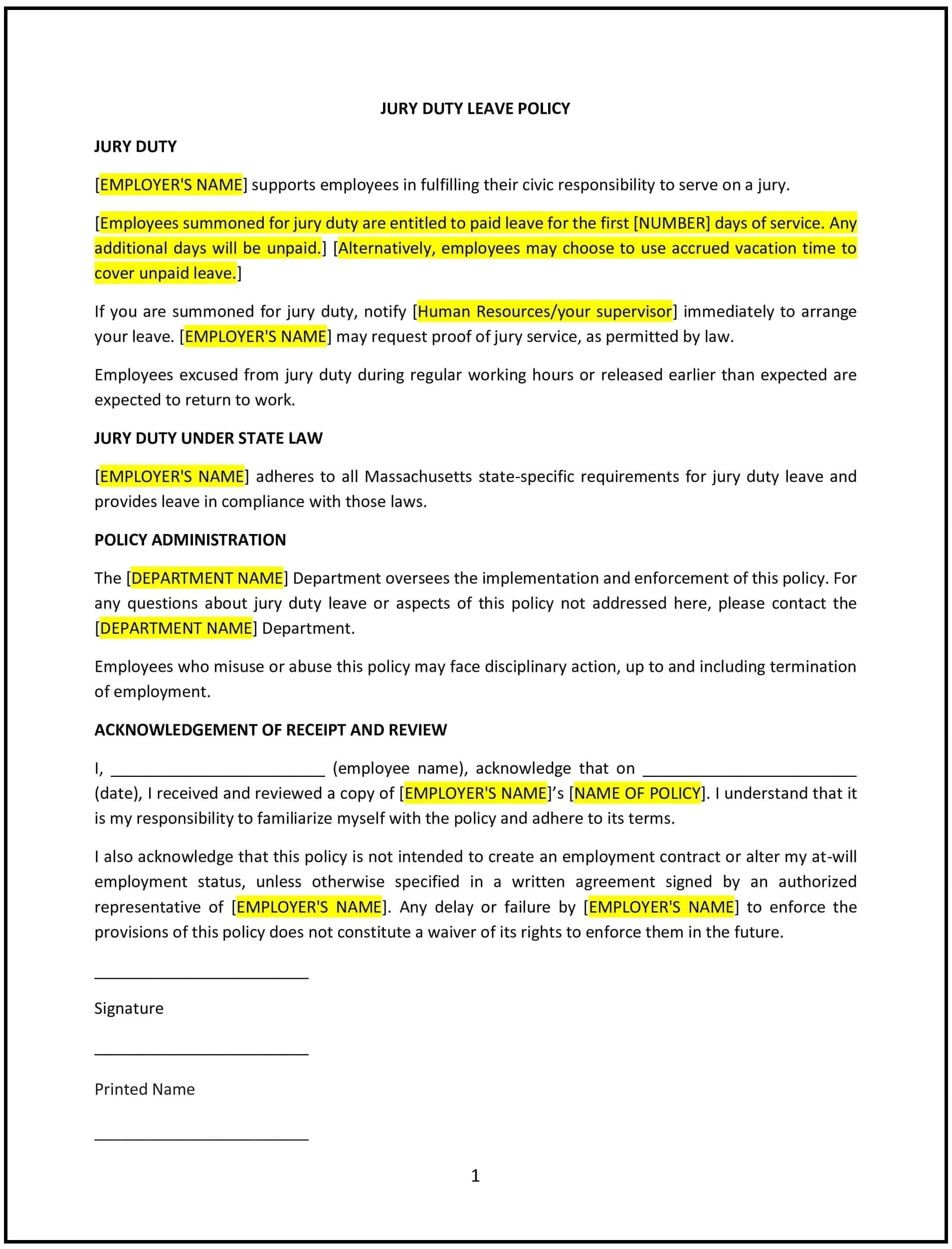Jury duty leave policy (Massachusetts): Free template
Got contracts to review? While you're here for policies, let Cobrief make contract review effortless—start your free review now.

Customize this template for free
This jury duty leave policy is designed to help Massachusetts businesses manage employee leave for jury duty service while maintaining operational continuity. The policy outlines the procedures for requesting leave, compensation during jury duty, and the company’s expectations regarding jury duty service. It ensures that employees are aware of their rights to take time off for jury duty, while maintaining compliance with Massachusetts state laws.
By adopting this policy, businesses can support their employees' civic duties, reduce the risk of legal disputes, and promote fair treatment for those serving on a jury.
How to use this jury duty leave policy (Massachusetts)
- Define eligibility for jury duty leave: Specify which employees are eligible for jury duty leave, including full-time, part-time, and temporary employees. The policy should outline the criteria for eligibility, including whether the employee has met a minimum length of service or hours worked.
- Outline the request process: Establish a clear procedure for employees to request leave for jury duty. Employees should notify their supervisor or HR department as soon as they are called for jury duty and provide a copy of the jury summons. The policy should specify the required notice period for requesting leave.
- Address compensation during jury duty: The policy should specify whether employees will be compensated during jury duty leave. Under Massachusetts law, employees are entitled to receive their regular pay for the first three days of jury service. If the employee is required to serve for more than three days, compensation may depend on the company’s policy or the employee’s contractual agreement.
- Define the duration of jury duty leave: The policy should specify how long employees can take off for jury duty. This includes time off for jury selection, trial attendance, or any other necessary court proceedings. The policy should clarify whether employees are entitled to take leave for the duration of their jury duty service.
- Outline job protection during jury duty leave: Ensure employees understand that they are entitled to job protection during their jury duty leave. The policy should specify that employees will be allowed to return to their same or an equivalent position once their jury duty service has concluded.
- Address additional requirements: The policy may include requirements for employees to provide documentation or updates regarding their jury service, including submitting a copy of the jury duty certificate upon completion of the service.
- Ensure compliance with Massachusetts and federal laws: Ensure that the policy complies with Massachusetts state laws regarding jury duty leave, including the Massachusetts Jury Duty Leave Law, and federal regulations governing employee rights during jury duty service.
- Review and update regularly: Periodically review and update the policy to ensure it remains in line with any changes in Massachusetts state laws or federal regulations regarding jury duty leave.
Benefits of using this jury duty leave policy (Massachusetts)
This policy offers several benefits for Massachusetts businesses:
- Supports employees' civic duties: By offering jury duty leave, businesses demonstrate their commitment to supporting employees in fulfilling their civic responsibilities without fear of losing income or employment.
- Improves legal compliance: The policy ensures that the business complies with Massachusetts state laws and federal regulations, minimizing the risk of legal challenges or penalties related to jury duty leave.
- Promotes fairness and equity: A clear and consistent policy ensures that all employees are treated fairly when called for jury duty, regardless of their role or tenure with the company.
- Protects employee morale: Offering jury duty leave shows that the company values its employees' participation in important civic functions, fostering goodwill and positive employee relations.
- Reduces legal risks: By enhancing compliance with state and federal laws, businesses can mitigate the risk of lawsuits or disputes related to jury duty leave, helping to avoid legal liabilities.
Tips for using this jury duty leave policy (Massachusetts)
- Communicate the policy clearly: Ensure that all employees are aware of the jury duty leave policy and understand the process for requesting leave and the compensation they are entitled to receive. The policy should be included in the employee handbook and discussed during onboarding.
- Monitor jury duty leave: Keep track of employee jury duty leave requests to ensure that leave is granted in accordance with the policy and that employees are compensated correctly for their time off.
- Provide support during jury duty: Be flexible and understanding when an employee is called for jury duty. Ensure that workloads are adjusted appropriately to accommodate the employee’s absence and minimize any disruptions to business operations.
- Address long-term or extended jury service: If an employee is called for extended jury service beyond the initial period, consider whether any additional accommodations or compensation should be provided based on the company’s policy or the employee's contractual agreement.
- Review and update regularly: Periodically review the policy to ensure it remains in compliance with Massachusetts state laws and any relevant changes to jury duty regulations. Update the policy as necessary to reflect any changes in business practices or legal requirements.